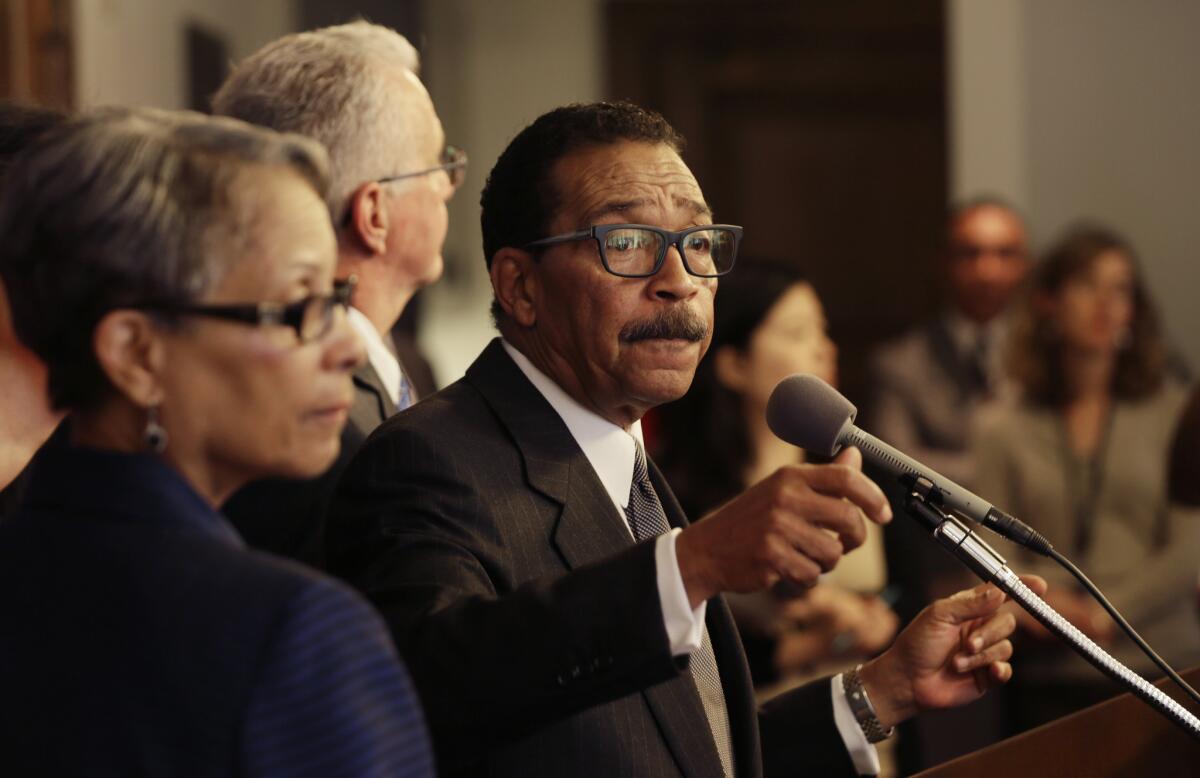L.A. should suspend vetting applications for pot shops amid concerns, Wesson urges

- Share via
Los Angeles City Council President Herb Wesson has called on the city to suspend the approval process for new shops selling cannabis products, arguing that the latest round of the licensing process was “compromised” by some people gaining early access to the application system.
In a letter to the Department of Cannabis Regulation, Wesson urged the department to stop processing applications for new marijuana retailers, refund the latest round of cannabis applicants, and get an independent audit of the process, “unless there are other options like processing every application” that would assure people that the process is untainted. Under the existing system, only a limited number of applications are slated to be reviewed, not every application that was submitted.
“These are the only options that will provide the clarity and time we need to ensure that the ... process is fair, transparent, and has integrity,” Wesson wrote in his letter.
Department of Cannabis Regulation spokeswoman Michelle Garakian said the department “is committed to the most fair and transparent process possible” and would meet with Wesson’s office soon “to discuss their recommendations.”
So far, the city has granted approval to more than 300 existing cannabis businesses, including both retailers and their suppliers, according to the Department of Cannabis Regulation. It has faced a torrent of criticism over the latest round of the approval process, a first-come, first-served system for applicants seeking to open new pot shops that could grant approval to 100 more businesses.
At a Cannabis Regulation Commission meeting last week, marijuana entrepreneurs complained that some people had gotten advance access to the application system while others struggled with slower internet speeds. Many argued that the process put the entrepreneurs who were supposed to get an edge — people from communities hit hardest by the war on drugs — at a disadvantage.
Cat Packer, executive director of the Department of Cannabis Regulation, said just two people had gained early access, due to a staff error after resetting their passwords for the computerized application system, and that their applications had been pushed back in line to where they would have ended up if they had not started the process ahead of time. Packer also said there was no evidence of bots being used to submit applications more quickly, as some critics had feared.
“The system operated as planned,” she told a plainly dissatisfied crowd at City Hall last week.
Wesson, in his letter, cited concerns about people accessing the system ahead of its official opening, saying that “unfortunately these allegations have been substantiated.” It is “paramount that the application process have the utmost integrity, be transparent, and fair,” Wesson wrote, and “there appears to be no scenario in which the ... process can meet those three principles currently.”
When the latest round of applications opened in September, the city was flooded with more than 300 applications within three minutes, according to the Department of Cannabis Regulation. Adam Spiker, executive director of the cannabis industry group Southern California Coalition, complained that the process had amounted to a “fastest computer contest.”
“It’s a game of musical chairs with a horrifically low amount of chairs in the middle,” Spiker said Tuesday. “And when the music stopped, a lot of people were upset and felt the process was flawed.”
California Minority Alliance co-founder Virgil Grant, whose group advocates for minority participation in the cannabis industry, had publicly raised concerns about the number of applicants with Armenian surnames who had gotten prime spots on the city list, saying that did not reflect the population in communities hit hardest by the war on drugs, which L.A. had vowed to prioritize.
Grant said Tuesday he was “ecstatic” that Wesson had asked to halt the process. “It has to be done,” Grant said. “They have to stop everything, refund everybody the money and get this done right.”
Others were concerned by the idea of further delays, which they said could be devastating to applicants who had been paying for leases to hang onto eligible storefronts.
“Any more delays would be unacceptable,” said Kika Keith, whose organization Life Development Group advocates for applicants in L.A.’s “social equity” program, which is aimed at helping communities disproportionately affected by the criminalization of marijuana.
Keith was pleased, however, that Wesson had also suggested reviewing all of the applications from this round, which she described as the best solution. Roughly 800 applications were submitted in this round, but Keith argued that many would not ultimately be eligible because of problems with their applications.
L.A. still has another phase of approval for retailers ahead, one that could provide spots for at least 150 more new businesses. Under city rules, it can also allow additional marijuana businesses to open in areas that have hit neighborhood caps for such shops if the City Council does not balk at those proposals.
More to Read
Sign up for Essential California
The most important California stories and recommendations in your inbox every morning.
You may occasionally receive promotional content from the Los Angeles Times.











